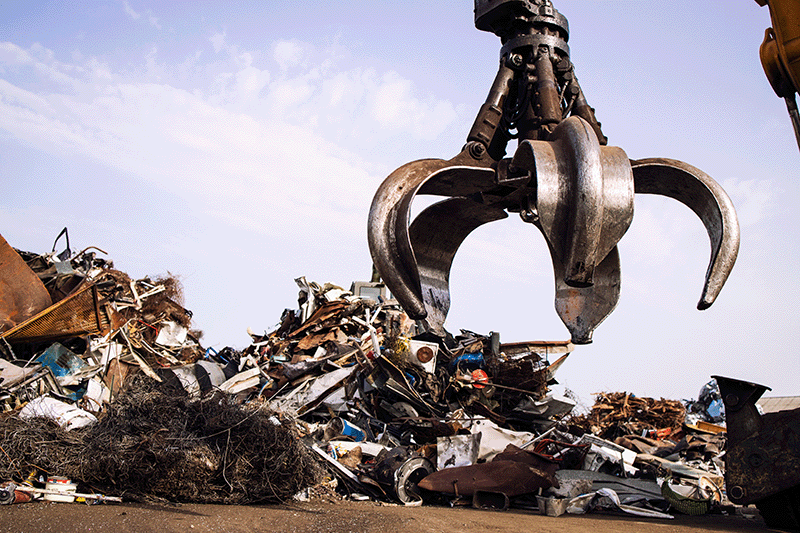Partner with Downstream

Scrap metal recycling isn’t just good for the environment—it’s also a way to add an extra revenue stream for your projects. Whether you’re overseeing demolition, tenant improvement, or general construction, handling scrap metal strategically can translate into higher rebates and stronger margins. In this guide, we’ll break down the key steps contractors and site managers can take to optimize their scrap metal recycling process. From sorting materials to negotiating with confidence, these tips are designed to help you maximize returns at the scrap yard.

Not all metals are created equal. Ferrous metals like steel and iron are commonly found on jobsites but typically yield lower rebates compared to non-ferrous metals such as copper, aluminum, and brass. By sorting metals on-site, you’ll:
For example, copper wiring stripped from a renovation can fetch significantly more than mixed construction debris. The Institute of Scrap Recycling Industries (ISRI) provides market insights that are worth following if you want to know what’s worth separating.
Scrap yards pay more for clean, uncontaminated metal. Taking the time to remove insulation, coatings, or dirt can directly increase your payout. While it might feel like an extra step, consider the difference between:
Even a small adjustment in how you prep materials can make a noticeable difference in rebates.
Just like many construction suppliers offer discounts for bulk orders, scrap yards may provide higher rates for large, bundled loads. Bundling metals by type not only simplifies logistics but can also strengthen your negotiating position.
Think of it this way: a truckload of sorted aluminum siding is far easier for a recycler to process than a mixed bin of metals and debris.

Understanding the relative value of different metals is crucial. Aluminum, copper, brass, and stainless steel typically command stronger rates than ferrous metals. Staying current with market pricing gives you an edge when negotiating.
Websites like Trading Economics track real-time market prices for commonly recycled materials. By keeping tabs, you’ll know when it’s worth holding onto material for a better payout.
Construction waste often includes mixed materials—metal combined with wood, plastic, or rubber. Taking the time to deconstruct and separate components pays off. For instance, removing plastic from HVAC ductwork or rubber from wiring insulation increases purity and ensures a higher return at the yard.
The scrap metal market can be volatile, with prices shifting due to global demand, supply chains, and commodity speculation. Contractors who pay attention to trends can plan their trips strategically. For example, holding copper for a few weeks during a rising market may result in a stronger payout.
When you show up with sorted, clean, and bundled scrap, you’re already in a stronger position to negotiate. Pair this preparation with knowledge of current pricing, and you’ll be better equipped to secure favorable rebates. Scrap yards respect contractors who know their materials.
Many yards now offer loyalty or frequent-customer programs, providing additional rebates, faster processing, or discounts on hauling. If you’re recycling consistently across multiple job sites, it’s worth exploring whether these programs can boost your long-term profits.
Scrap recycling is governed by local and state regulations, especially when dealing with construction and demolition debris. Proper documentation not only protects your business from fines but also ensures smoother transactions at the yard. Always confirm your compliance before hauling large loads.
If you’re new to scrap recycling or working on a project with unusually high material volume, consulting an experienced recycler can be well worth it. Professionals can help identify valuable metals you may have overlooked and provide insights into timing, preparation, and resale strategies.
Managing construction waste and recycling shouldn’t slow down your build. With Downstream, contractors can rent the right equipment to streamline jobsite operations—including dumpsters, loaders, and other site essentials. By simplifying logistics, Downstream helps you focus on your core work while maximizing value from scrap and debris.
Whether you’re balancing multiple job sites or handling a single high-volume project, Downstream connects you with trusted suppliers to keep your operation efficient and profitable.
Scrap metal recycling is more than just hauling waste—it’s a strategic opportunity for contractors to reclaim value. By sorting, cleaning, bundling, and staying market-aware, you’ll position your business to capture higher rebates and stronger margins on every job.
-min.webp)
Quis nostrud exercitation ullamco laboris nisi ut aliquip ex ea commodo consequat. Duis aute irure dolor in voluptate.
